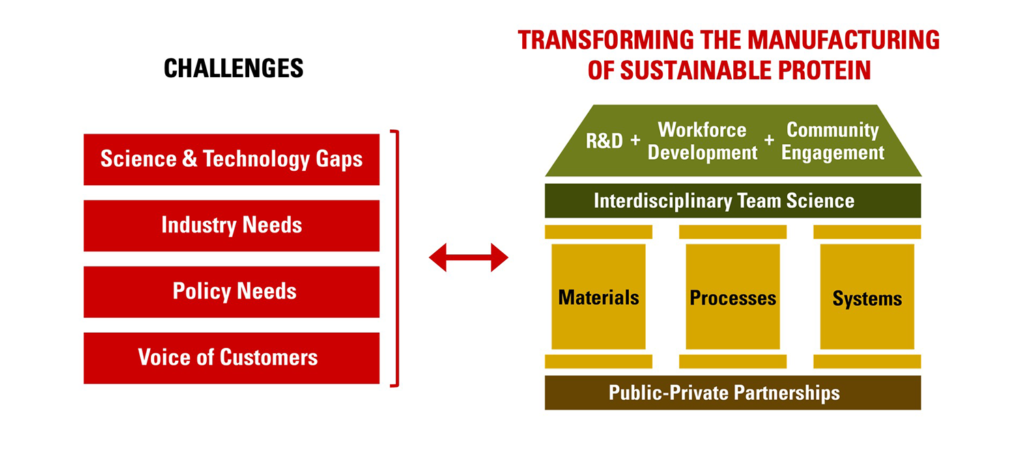Bezos Center for Sustainable Protein at NC State
North Carolina State University was awarded $30 million over five years from the Bezos Earth Fund to lead a center of excellence to create a biomanufacturing hub for dietary proteins that are environmentally friendly, healthy, accessible and affordable.
The center will include numerous partners from academia and industry to research, create and commercialize new technologies for manufacturing various protein products. Efforts will focus on three areas:
- The Research and Development team will strive to improve the palette of materials used to extract proteins or to use as raw materials for fermentation and cell cultivation; make manufacturing processes for sustainable protein products more efficient and less costly, using advanced biotechnology and manufacturing methods; and train the center’s faculty and students on innovation and intellectual property as well as commercialization models, tools and strategies to facilitate new technology transfer to industry.
- The Workforce Development team aims to set standards for educating and training students and personnel in advanced food technologies; ensure that curricula span all age and grade levels as well as professional training; and implement programs that extend NC State’s Biomanufacturing Training and Education Center’s groundwork in pharmaceuticals to advanced food technologies.
- The Capacity Building team will reach out to community stakeholders – consumers, farmers and chefs, for example – to understand their perceptions, preferences and expectations of sustainable protein foods and use the results to inform outreach strategies. It will also conduct workshops with industry members and regulators to understand policy and regulatory trends, drivers, barriers and enablers. And it will create a biennial sustainable protein boot camp for stakeholders from countries that will benefit the most from environmental benefits of alternative protein technology.

“NC State’s College of Engineering has made critical investments in biofabrication and other advanced manufacturing processes and this grant will enable even more investment in this important area,” says Jim Pfaendtner, Louis Martin-Vega Dean of NC State’s College of Engineering. “The college also has a wealth of experience in standing up centers of this type in areas including health monitoring, renewable energy and artificial intelligence in education to help tackle global problems that cut across disciplines.”
“Our interdisciplinary research supports animal and plant protein production to sustain human health. We also have a proven record of research and extension work to support sustainable animal and plant agriculture, the state’s No. 1 industry, which generates more than $100 billion in annual economic impact,” said Garey Fox, dean of NC State’s College of Agriculture and Life Sciences. “Innovative use of technology in animal sciences, plant sciences, human health, engineering and food technologies is vital to successful food production with a growing demand for protein, a cornerstone of our Food-Animal Initiative.”

Academic Partners
- NC A&T State University
- UNC-Pembroke
- Forsyth Tech Community College
- Duke University
Industry Partners
| Advanced Solutions Life Sciences | GEA Group |
| Alfa Laval Inc. | Givaudan |
| Ardent Mills | Improved Nature |
| Atlantic Fish Co. | Jellatech |
| Believer Meats | NETZSCH Premier Technologies |
| Big Idea Ventures | Novonesis |
| BioBrew Technologies Inc. | Sable Fermentation, Inc. |
| Bühler Group | SPX Flow |
| Cargill, Inc. | Ummino |
| CRB Group | Wild Earth |
| Elohi Strategic Advisors |
FAQs
Why are proteins essential to human health?
Proteins are essential building blocks of life. Without the amino acids in protein, our cells, tissues and organs can’t function.
Why is NC State uniquely positioned to help shape the future of alternative proteins as a land-grant university in a state with significant animal agriculture?
NC State’s interdisciplinary research supports animal and plant protein production to sustain human health. We have a proven record of research and extension work to support agriculture, the state’s No. 1 industry, which generates more than $100 billion in annual economic impact. We work extensively with farmers and food processors to help them adapt to changing conditions, financial pressures and emerging market opportunities.
Who better than NC State to help tackle the challenges of protein production of all kinds?
NC State is best positioned to be on the leading edge of this technology because we know food systems, food science and, most importantly, agriculture. Innovative use of technology in plant sciences, human health, engineering and food technologies is vital to successful food production. This project builds upon legislative investments in the N.C. Food Innovation Lab (NCFIL) in Kannapolis and the College of Engineering’s Fitts-Woolard Hall.
Why is there a need to develop more ways to feed 10 billion people as soon as 2050?
We reached a world population of 8 billion people in November 2023, according to United Nations estimates. We know from research that as populations grow, the demand for animal-based protein increases, particularly as incomes rise. In addition to the overall need for high quality protein, we need innovation to respond to dietary preferences and trends in the U.S. and worldwide. As they make food choices, more consumers are seeking ways to improve their health, reduce food waste and lower the environmental impact of food production and consumption. Along with vegetarians and vegans, we’re seeing an increase of flexitarians interested in adding more plant-based protein to their diets in lieu of animal sources exclusively. Taking a leadership role in alternative protein research allows NC State to shape the future of this important work.
What will the Center do?
The Center will focus on advancing science and technology, workforce development, and community outreach for the three primary types of sustainable proteins:
- Plant-based products
- Precision fermentation to produce proteins and nutrients that can be used in food formulations
- Cultivated meat grown from animal cells
Additional Links
- Bezos Earth Fund
- Golden LEAF Biomanufacturing Training and Education Center (BTEC)
- NC Food Innovation Lab
- NC State Plants for Human Health Institute
- NC State Genetic Engineering and Society (GES) Center
- NC State Center for Environmental Farming Systems (CEFS)